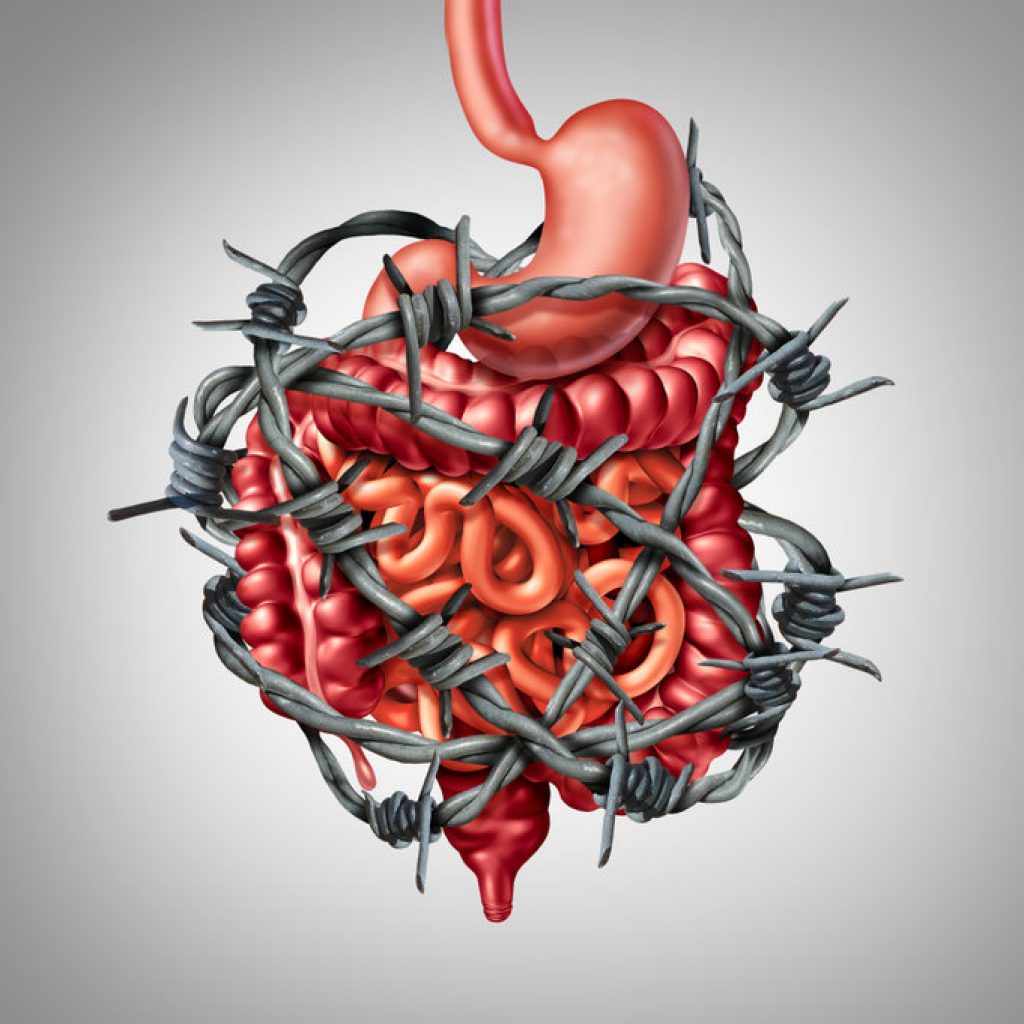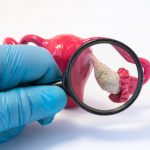MATTHEW STRICKLAND, ND
Irritable bowel syndrome, also known as IBS, is a diagnosis given to patients suffering from gastrointestinal pain and altered bowel habits without any detectable structural or biochemical abnormalities.1,2 IBS is a diagnosis of exclusion, often given after other testing has ruled out more severe gastrointestinal disorders like Crohn’s disease and ulcerative colitis. The Rome diagnostic criteria are often used to diagnose IBS. This presents its own challenge because these criteria have changed over time and what was considered IBS under the previous version of the Rome criteria may not correlate with the current version, and vice versa.3 What is clear is that a significant percentage of people suffer from functional gastrointestinal disorders (ie, gastrointestinal symptoms without any confirmed cause). The estimate of the percentage of people with IBS worldwide was around 10% according to the older Rome III criteria and is around 4% according to the newer Rome IV criteria.1 To diagnose IBS under the Rome IV criteria,3 a patient must have experienced recurrent abdominal pain for at least 1 day a week over 3 months. This pain must be related to instances of defecation itself, a change in stool frequency, and/or a change in stool form or appearance. Furthermore, these symptoms must have begun at least 6 months prior to a diagnosis.
Presentation
A 45-year-old female presented to my office with digestive disturbance of 10 years’ duration. The symptoms started gradually and included intestinal pain, bloating, low energy, and increased frequency of bowel movements. The symptoms were episodic, starting either gradually or suddenly, and lasting from 1 to 10 days. These episodes were followed by asymptomatic periods. The episodes had recently become more severe, prompting her to schedule a visit. She had recently developed new symptoms where she felt rectal pain and had the sense that she could feel the insides of her intestines. Throughout the course of the 10 years of episodes, she had no blood or mucus with defecation.
She had previously tried dietary modifications without success. When the symptoms started 10 years prior, she eliminated gluten and caffeine from her diet. Earlier in the year of her presentation, she tried the Gut and Psychology Syndrome (GAPS) elimination diet for 3 months without a change in symptoms. She noted that she avoided yeast in breads because it triggered cramping and bloating. She had been making and drinking her own kombucha for the previous 6 years without any notable change in her symptoms.
The patient exercised 4-5 times per week, including both strength training and aerobic exercise. She previously tried fish oil, vitamin D, and an unknown type of probiotic – all without benefit. Finally, she also complained of headaches triggered by stress, sugar, fatigue, and hormonal changes.
Treatment
Based on her presentation, the following interventions were given:
- Magnesium glycinate – 240 mg (taken at bedtime)
- Probiotic – Single dose pill containing 2 billion spore cells of a mixture of probiotic strains (Bacillus indicus, Bacillus subtilis, Bacillus coagulans, Bacillus licheniformis, and Bacillus clausii) (taken with breakfast)
- Tincture – Sweet wormwood (Artemisia annua), black walnut hulls (Juglans nigra), pomegranate arils (Punica granatum), coptis root (Coptis chinensis), wormwood (Artemisia absinthium), clove buds (Syzygium aromaticum), gentian root (Gentiana lutea), and ginger (Zingiber officinale) (35-day course, tapered up from 1 dropperful to 3, taken between meals)
- Dietary modification – Eliminate any food containing gums (if no relief after 2 weeks).
Follow-Up
At her 8-week follow-up she described her symptoms as “incredibly better.” She had only 3 brief bouts of bloating and they all lasted less than a day. She had no episodes of intestinal pain and felt like she had increased energy. Her stool consistency and frequency were normal, and stool was easy to pass. She had tried to avoid foods with gums. She described the change after she started the tincture as “gradual.” With time, she got to the point that she just felt “good” consistently. Her headaches were less intense and less frequent. Her instructions were to continue to take the probiotic for at least another 4 months and to follow up as needed.
Discussion
The treatment in this case consisted of magnesium given for headaches (also as an antispasmodic/relaxant), a probiotic, a strong antimicrobial tincture, and a slight dietary modification. Specific strains of the probiotic have been shown in placebo-controlled trials to be effective in IBS.5 The components of the tincture have demonstrated activity against bacteria6-8 and parasites.9 Gums are long-chain carbohydrates with branched-chain structures. They increase viscosity of the fluid they are added to but are hard to digest and have been shown to induce inflammation.10 The combination of interventions led to a relatively quick resolution of symptoms, especially considering the patient had been symptomatic for 10 years.
The most common risk factor for an IBS diagnosis is a previous gastrointestinal infection.1 In this case, there was no reported infection around the onset of symptoms, but that piece of information can provide an important clue when evaluating a patient for IBS.
Traditionally, IBS has been viewed as a combination of visceral hypersensitivity leading to abdominal pain and gastrointestinal motility disturbances leading to constipation or diarrhea (of a mainly psychological origin).2 New evidence showing diverse changes in the microbiome in IBS patients,1 response of subgroups to antibiotics,4 and the risk factor of a previous gastrointestinal infection suggest organic pathology in at least some IBS patients. The resolution of symptoms with antimicrobial and probiotic therapy in this case adds further evidence to support that hypothesis.
References
- Ford AC, Sperber AD, Corsetti M, et al. Irritable bowel syndrome. Lancet. 2020;396(10263):1675-1688.
- Saha L. Irritable bowel syndrome: pathogenesis, diagnosis, treatment, and evidence-based medicine. World J Gastroenterol. 2014;20(22):6759-6773.
- Lacy BE, Patel NK. Rome Criteria and a Diagnostic Approach to Irritable Bowel Syndrome. J Clin Med. 2017;6(11):99.
- Pimentel M, Chow EJ, Lin HC. Eradication of small intestinal bacterial overgrowth reduces symptoms of irritable bowel syndrome. Am J Gastroenterol. 2000;95(12):3503-3506.
- Majeed M, Nagabhushanam K, Natarajan S, et al. Bacillus coagulans MTCC 5856 supplementation in the management of diarrhea predominant Irritable Bowel Syndrome: a double blind randomized placebo controlled pilot clinical study. Nutr J. 2016;15:21.
- Pagliarulo C, De Vito V, Picariello G, et al. Inhibitory effect of pomegranate (Punica granatum L.) polyphenol extracts on the bacterial growth and survival of clinical isolates of pathogenic Staphylococcus aureus and Escherichia coli. Food Chem. 2016;190:824-831.
- Wang J, Wang L, Lou GH, et al. Coptidis Rhizoma: a comprehensive review of its traditional uses, botany, phytochemistry, pharmacology and toxicology. Pharm Biol. 2019;57(1):193-225.
- Ajiboye TO, Mohammed AO, Bello SA, et al. Antibacterial activity of Syzygium aromaticum seed: Studies on oxidative stress biomarkers and membrane permeability. Microb Pathog. 2016;95:208-215.
- Ramazani A, Sardari S, Zakeri S, et al. In vitro antiplasmodial and phytochemical study of five Artemisia species from Iran and in vivo activity of two species. Parasitol Res. 2010;107(3):593-599.
- Silva Rischiteli AB, Neto NIP, Gascho K, et al. A diet including xanthan gum triggers a pro-inflammatory response in Wistar rats inoculated with Walker 256 cells. PLoS One. 2019;14(6):e0218567.

Matthew Strickland, ND, is a leader in integrative, functional, and naturopathic medicine. He treats patients at a distance, as well as in-person at his clinic, Southeastern Integrative Health and Wellness, in Durham, NC. Dr Strickland is currently serving as Vice President of the North Carolina Association of Naturopathic Physicians.





